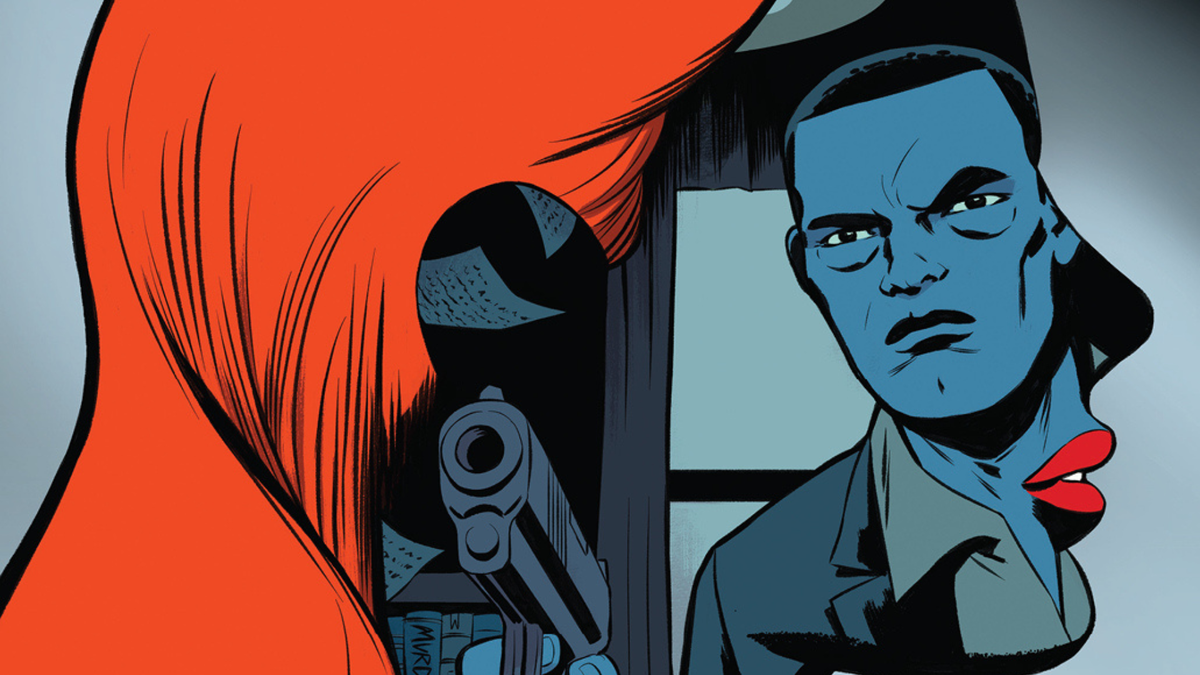
Fictional detectives seem to have it all figured out. No matter how seemingly impossible the case, they manage to find the right clue at the right time, which leads them to a conclusion that often seems obvious in hindsight, all within a neatly-paced story that wraps things up on a high note before the reader grows sick of it. The killer is caught, the detective is a hero, and the author begins formulating the next mystery. But what happens when the victim is the author? That’s exactly the dilemma titular detective Will Profane finds himself facing in Peter Milligan’s Profane.
*Mild spoilers ahead for Profane issues #1-5*
The story starts out familiarly enough. Detective Will Profane enters the home of an unidentified individual, providing just enough context through his internal monologue to reveal that this mystery person is dead. Just as he comes upon what can only be assumed is the victim’s body, he suddenly finds himself sitting in his favorite bar, ordering another whiskey with absolutely no recollection of how or when he arrived there. He tries to remember, but to his dismay, he finds that he’s unable to recall anything. A beautiful woman he meets at the bar offers a distraction for his distress, though he tells himself to “Show a little willpower” as “Now is no time to be messing around with beautiful women.” So naturally, he finds himself in bed with her, his inner dialogue continuing to explain how this is a character flaw of his, as if he has no control over it. Something I’ll come back to in a bit.
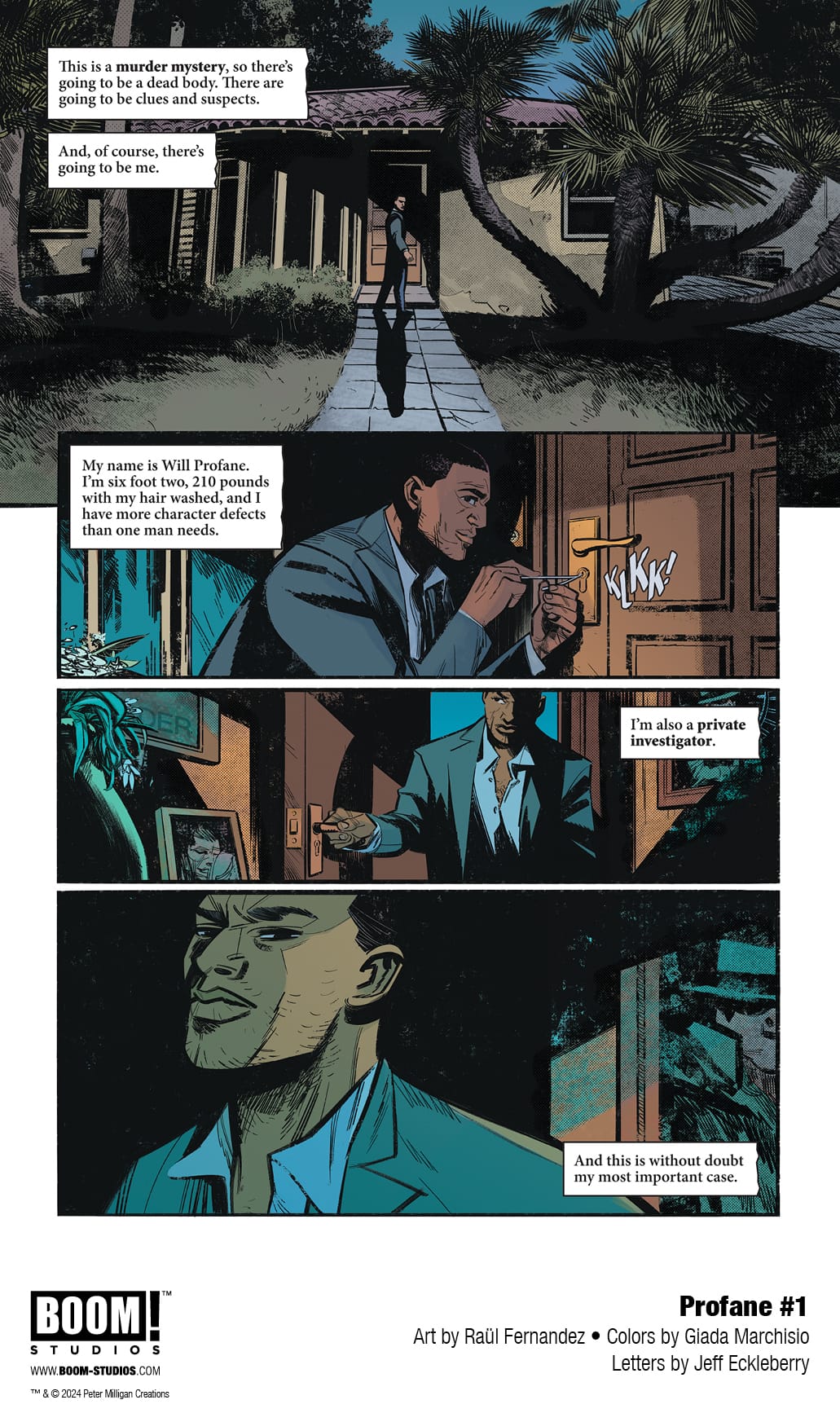
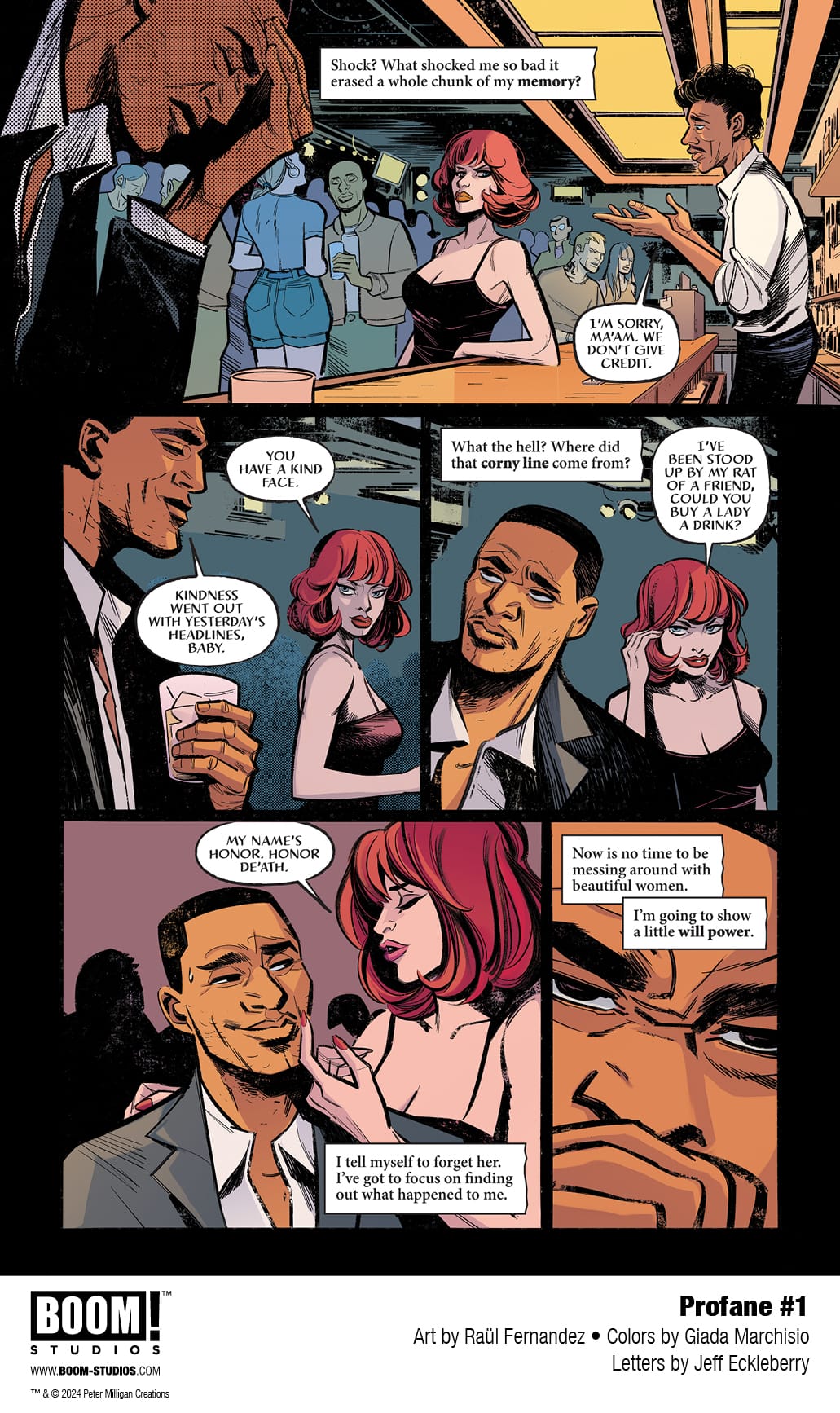
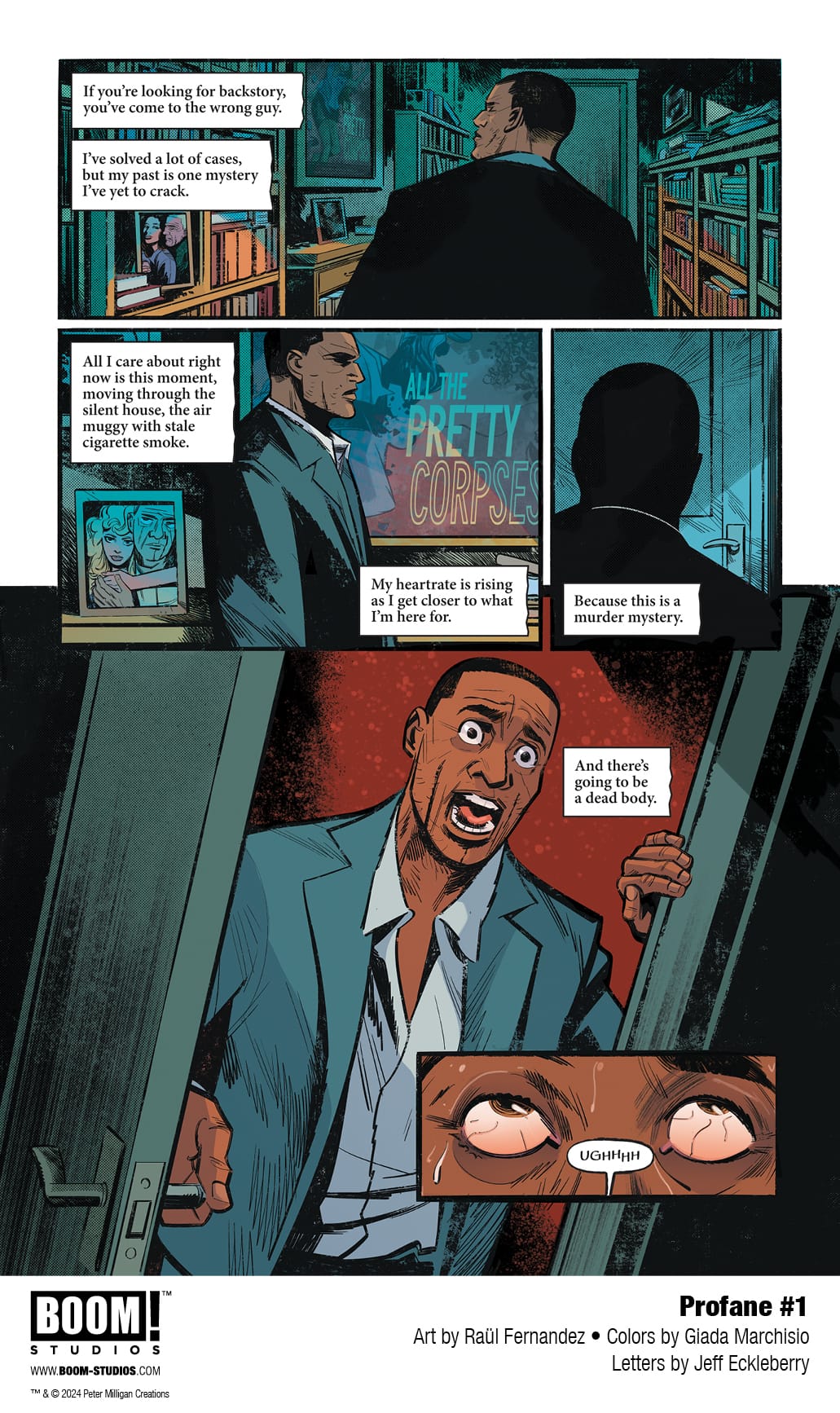
Detective Profane’s inner dialogue is a consistent aspect of the story, which at times can come across as overly expository, particularly in the beginning. However, there’s a good reason for this, which is revealed at the end of the first chapter: Detective Profane isn’t real. He’s actually a fictional character created by author Spud Coltrane for a series of detective novels, meaning that every aspect of his life is a product of the writer’s decisions rather than Profane’s own conscious choices. There’s just one minor problem: Coltrane has been murdered, and in addition to giving Profane a case unlike anything he’s encountered thus far, this also creates the dilemma of what happens to a fictional character when the writer directing their life dies.
It probably goes without saying that the story quickly becomes incredibly meta as Profane tries to uncover who killed Coltrane and why. Honestly, the story could have simply focused on this aspect, following Profane’s journey as he tries to solve a mystery whose triumphant ending hasn’t been written by his author. That premise alone has the makings of a captivating story.
However, Milligan goes beyond this by using Profane to explore the nature of free will. Being a fictional character, Profane’s character has been completely decided for him by his creator. He himself makes this assessment numerous times throughout the story, questioning whether he actually likes certain things or if he just does them because that’s how his author wrote him, even lamenting certain characteristics of his and cursing Coltrane for writing him that way. But is he as powerless to escape his creator’s whims as he initially seems? Does his life end now that his creator is dead and can no longer write what will happen next in Profane’s life? Or can he continue on to become who he chooses to be, despite being a fictional character? Of Course, I’m not going to provide the answers to those particular mysteries here.
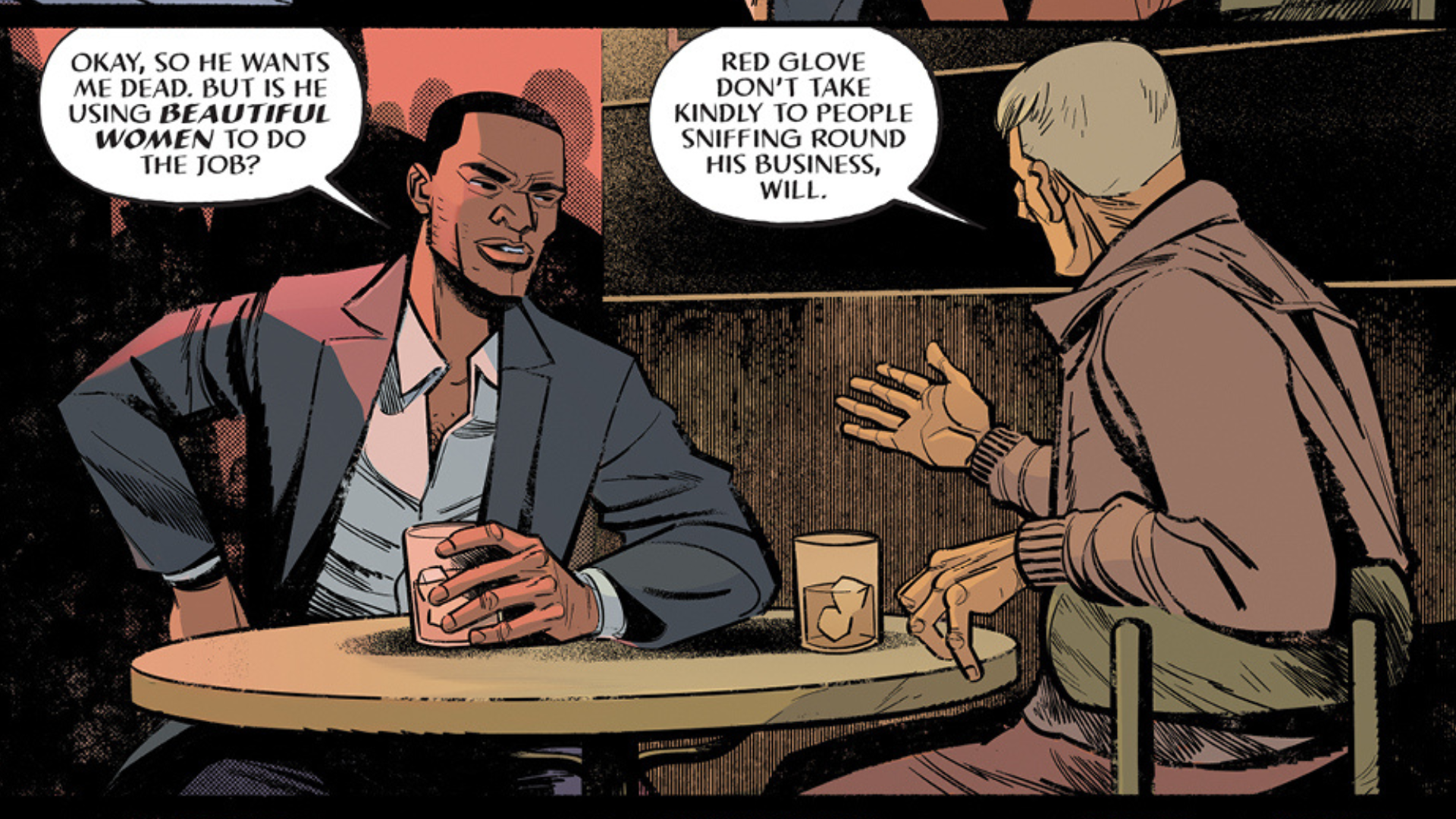
Focusing back on the story, it’s your typical murder-mystery. Detective Profane works his way through clues and suspects, leading to tense conflicts that he narrowly escapes from as he gets steadily closer to uncovering the true culprit, all the while having time for some intimate moments with a love interest. There are twists, misleads, and ah-ha moments where the hero stumbles upon a clue just when he’s feeling stumped. It’s very familiar to anyone that’s read or watched a murder-mystery before. But being familiar doesn’t mean that it’s not a fun story, especially with all of the strange elements of this world.
In addition to the revelation that he’s a fictional being—or ‘fictive,’ as they are called in this world— the story introduces a number of supernatural aspects to help Detective Profane with this case, as well as give the otherwise familiar beats of this murder-mystery a fresh feel. The most crucial and prominently used of these is something called “scrying,” which somehow lets him see things that have happened, or maybe are happening right then…or will happen? It’s never really explained, nor does Profane himself seem to know how it works, given that he’s a fictional character just doing what his writer makes him do. All he knows is that it works, so he keeps doing it.

Which brings me to my biggest issues with the story. Many things simply happen, with the story either brushing them off as if they are everyday occurrences, justifying them as being due to the fictional nature of the characters involved, or just outright ignoring them. Don’t get me wrong, I’m fully supportive of a writer presenting their world the way they desire in order to tell the story they want. Not everything needs to be or should be explained for a story to be enjoyable. But in several instances in this book, I found myself pulled out of the story by things that raised questions the story refused to answer. It’s a minor criticism, however, and one that doesn’t take away from the fun of the adventure overall.
Profane is available now from BOOM! Studios.
Profane
Great
Profane offers an interesting new take on a murder-mystery, with twists that will keep you hooked all the way to the end. It’s meta enough to be immensely fun without completely losing itself in its premise. Whether you’re a fan of detective stories or just enjoy a fun adventure with interesting elements and enough self-awareness to be entertaining without being annoying, this is definitely worth a read.
Pros
- Interesting premise with a satisfying payoff
- Unique elements that help it stand out from other murder-mysteries
Cons
- Some elements could have benefited from further explanation to strengthen the worldbuilding
This review is based on a retail copy provided by the publisher.
